How Much Health Does Minecraft Animal Feed Traders
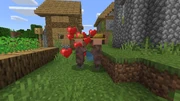
Two villagers breeding.

A wolf pup with its parents.
Breeding is a game mechanic that allows mobs of the same species to breed with each other to produce offspring (with the exception of breeding a mule, which requires a horse and donkey).
Mechanics [ ]
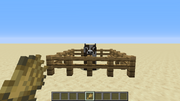
A cow following the player.
Each animal that can be bred has a food item used to lead and breed it (there are a few special cases, described below). Once an animal notices a player holding its food, it follows the player until either the player is out of range, the player stops holding the item, it begins the breeding process, or it is attacked. Baby animals behave the same way. Note that animals are uninterested in food lying on the ground. One item per parent is needed to breed a single baby.
Love mode [ ]
When an animal is fed its food, it enters "love mode", preparing to breed with another animal of the same species that is also in love mode. Animals that are in love mode emit heart particles constantly. When both animals are fed, they pathfind toward each other, up to eight blocks away. The two animals kiss for about two and a half seconds, and then a baby animal of the same species spawns either in between the parents or in the same position as the parent that was spawned first, ending love mode for the parents. Breeding also drops 1–7. The parents do not eat breeding items for 5 minutes, after which feeding them once again causes them to enter love mode. However, they still follow players holding breeding items, as does the baby. An animal exits love mode if it does not breed 30 seconds after being fed; however, it immediately becomes able to be fed and enter love mode again.
Unlike other animals, mules can not be bred this way. Breeding a mule requires a union between a horse and a donkey.
Breeding foods [ ]
| Mob | Items | Other | ||||
|---|---|---|---|---|---|---|
|
| The following can also be used for growing a baby horse or donkey, and for healing:
| ||||
|
| Sheep can grow faster if they eat grass . | ||||
| Pig |
| |||||
| Chicken |
| |||||
| Wolf (Tamed) |
| Tamed wolves must be at full health before being fed to breed. They must be fed to restore HP. Meat cannot be used to tame a wolf. Only bones can be used to tame wolves. In Bedrock Edition, the following can also be used for healing, but cannot be used for breeding nor growing a baby wolf:
| ||||
|
| Tamed cats must be at full health before being fed to breed. They must be fed to restore HP. Ocelots also trust players. | ||||
| Axolotl |
|
| ||||
|
| The following can also be used for growing a baby llama, and for healing:
| ||||
| Rabbit |
| |||||
| Turtle |
| Unlike other mobs, turtles do not have the babies immediately, instead they lay eggs that take a few days to hatch. | ||||
| Panda |
| To breed requires 8 bamboo at radius of 5 blocks. | ||||
| Fox |
| The baby fox always trusts the player and does not run away when approached. | ||||
| Bee |
| All one-block-tall and two-block-tall flowers work, including wither roses. Feeding bees wither roses gives them the Wither effect and does not anger them. | ||||
| Strider |
| Crimson fungi do not work. | ||||
| Hoglin |
| Breeding hoglins with warped fungi does not work, as hoglins are repelled by them. | ||||
| Frog |
| Like turtles, frogs do not have the babies immediately, instead they lay eggs that take a few days to hatch. |
Villagers [ ]
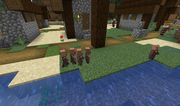
A group of villager children playing tag.
Villagers do not breed automatically when given food. Villager breeding depends on both the number of valid beds in the area (see the village page for full details), as well as whether the villagers are "willing." A villager may become willing if they have 3 bread, 12 carrots, 12 potatoes, or 12 beetroots in their inventory. They may also become willing as a result of trading with a player. When they breed, they produce a smaller villager. Unlike many baby animals, baby villagers do not have big heads in Java Edition. Baby villagers run around the village, and can "play" tag. A baby villager killed by a zombie may become a baby zombie villager, depending on difficulty.
Breeding formula [ ]
A player may want to know the number of mobs required in a farm to reach a certain goal, for example: to make a full-powered enchanting table with bookshelves (46 leather needed) or for full leather armor (24 leather), in case the player has a cow farm. There is a formula to calculate how many mobs are needed in a farm, by the starting number and if the player waits until all the mobs become mature (this does not apply to villagers):
where is the number of mobs at generation , and is the floor() operation.
When using larger values of n, it may be easier to approximate the number of mobs using an exponential function to avoid doing too many recursive calculations:
where the input is the n-th generation and the output is the approximate number of mobs after breeding. The constant is Euler's number.
Alternatively, if the player starts with mobs and wants to reach a population of at least , it can be achieved in generations, where is the ceil() operation.
Baby mobs [ ]
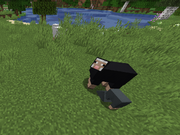
An example of how a bred sheep inherits a mixture of its parents' colors when possible.
Except for baby frogs, baby animals are smaller variations of their parents, having small bodies, relatively big heads, and faster walking speeds. Their sounds are the same as their adult variants but 50% faster and are pitched up by 6 semitones. Lambs cannot be sheared for their wool, chicks do not lay eggs, calves and mooshroom calves cannot be milked, and horses, mules, donkey foals, piglets and stridlings cannot be saddled or ridden. They do not drop loot or experience if killed (excluding baby zombies and their variants).
Except for baby rabbits[1], wild wolf pups, ocelot kittens, stray kittens, and baby turtles[2] and tadpoles, most baby animals (in Java Edition) and except for tadpoles almost all baby animals (in Bedrock Edition) choose and follow an adult within 8 blocks of the same species, regardless of whether it is their parent. Babies can choose new targets to follow whenever they don't have a valid target, such as when the previous target dies or moves further than 16 blocks away. Tamed pups and kittens follow their owner if the parent is absent or sitting, and pups attack aggressive mobs just as a mature wolf would.
When lambs are born, they usually inherit the color of one of their parents, chosen at random. However, if the parents have "compatible" colors (meaning that their corresponding dye items could be combined into a third dye), the lamb inherits a mix of the parents' colors (see Dye). This holds even if one or both of the parents have just been sheared before breeding and have not yet grown their coats back. In Bedrock Edition, however, lambs do not inherit the combined colors of their parents.
Baby animals can be manually spawned by using spawn eggs on a grown animal. This also works on zombies or variants.
Baby animals may also be spawned using the /summon command with a negative Age tag; for example, using /summon sheep ~ ~ ~ {Age:-100} spawns a baby sheep at the player's position, that matures in 100 ticks (5 seconds). For baby mobs that don't grow up like zombies and piglins, the IsBaby:1 tag is used instead.
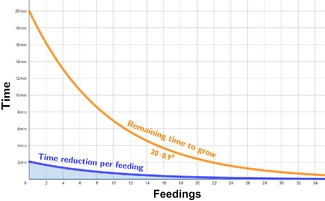
Baby animals take 20 minutes to grow up. This can be accelerated by feeding them their breeding item. Green sparkles appear similar to those caused by bone meal. Each feeding reduces the remaining time before the animal grows up by 10%. The less time remains, the less time is saved by each feeding, making it inefficient to feed an animal continuously until it becomes an adult. After the eighth feeding, the time saved by one feeding is less than a minute, as shown in the graph. Horses, donkeys, and llamas have different mechanics: different breeding items grow babies by different amounts, and each item ages babies by a constant time rather than a percentage of the remaining time.
Baby undead mobs and baby piglins cannot be bred and never grow up. Baby polar bears (cubs) can grow up, but cannot be bred, and growth time cannot be accelerated.
Baby hoglins are considered a monster in Java Edition, but are considered an animal in Bedrock Edition. This is because hoglins and baby hoglins are counted toward the monster mob cap in Java Edition, while in Bedrock Edition, they are counted toward the animal mob cap, despite its hostile nature.
Animals [ ]
All of these mobs are considered animals, as the majority of them are real-life animals. The majority of these mobs can be created when their parents have entered love mode after being fed.
Monsters [ ]
Any baby mob that counts toward the "Monster Hunter" and "Monsters Hunted" advancements or are simply undead is considered a monster and belongs here. Out of all these monsters, only hoglins can be bred, and can grow up into its adult form. The rest of these baby monsters cannot be bred and never grow up.
Other [ ]
Villagers are produced from breeding, but do not count as animals or monsters.
Achievements [ ]
| Icon | Achievement | In-game description | Actual requirements (if different) | Gamerscore earned | Trophy type (PS4) | |
|---|---|---|---|---|---|---|
| PS4 | Other | |||||
| Repopulation | Breed two cows with wheat. | Breed two cows or two mooshrooms. | 15G | Bronze | ||
| Zoologist | Breed two pandas with bamboo. | — | 40G | Gold | ||
Advancements [ ]
| Icon | Advancement | In-game description | Parent | Actual requirements (if different) | Resource location |
|---|---|---|---|---|---|
 | The Parrots and the Bats | Breed two animals together | Husbandry | Breed a pair of any of these 23 mobs:
| husbandry/breed_an_animal |
 | Two by Two | Breed all the animals! | The Parrots and the Bats | Breed a pair of each of these 22 mobs:
| husbandry/bred_all_animals |
History [ ]
| Java Edition | |||||
|---|---|---|---|---|---|
| 1.0.0 | September 9, 2011 | Jeb tweets that animal breeding is pushed to 1.9. | |||
| September 25, 2011 | Notch also tweets an image of dozens of sheep crowded together, saying "They won't stop breeding!!!" | ||||
| Beta 1.9 Prerelease 2 | Introduced breeding. Animals could breed instantly, without any "cooldown". | ||||
| No baby animals yet; all animals were born fully-grown. | |||||
| All sheep were born with white wool, irrespective of their parentage. | |||||
| October 3, 2011 | Notch tweets the first image of a cow calf and piglet. | ||||
| Beta 1.9 Prerelease 2 | Snow golems can enter love mode using wheat. | ||||
| Beta 1.9 Prerelease 3 | Added calves, mooshroom calves, lambs, piglets, and chicks. | ||||
| Animals now enter "love mode" when fed with wheat. | |||||
| Interestingly, snow golems could also enter love mode before this update. | |||||
| Beta 1.9 Prerelease 5 | Baby animals now work in multiplayer.[ more information needed ] | ||||
| Beta 1.9 Prerelease 6 | Lambs can be either of their parents' colors, even if they were dyed. | ||||
| 1.2.1 | 12w03a | Wolves can be bred with any type of meat to produce pups. | |||
| 12w04a | Cats (tamed ocelots) can now be bred with raw fish for kittens. | ||||
| 12w08a | Baby villagers and kittens are now the only baby mobs that have a head the right size for the body. | ||||
| 1.3.1 | 12w22a | Breeding now give experience. | |||
| 1.4.2 | 12w32a | Zombies that infect villager children now create zombie villager children, which are faster than normal zombies, do not age, and survive in sunlight. | |||
| 12w36a | Pigs are now responsive to carrots, chickens to seeds, with cows and sheep still breeding with wheat. | ||||
| 1.6.1 | 13w16a | Added horses, donkeys, and mules, all of which except mules can breed to produce foals. | |||
| 1.6.2 | pre | Zombie and zombie pigmen children now spawn naturally among regular ones. | |||
| 1.8 | 14w02a | Baby mobs can be grown faster by being fed. Each feeding reduces the remaining time to maturity by 10%, having no effect if less than 9 seconds remain. 28 feedings reduce the remaining time to around a minute, from the initial time of 20 minutes. In addition, lambs reach maturity one minute sooner for every time they consume grass. | |||
| January 27, 2014 | Dinnerbone tweets an image of many cows, presumably testing the breeding system. | ||||
| 14w26c | Wheat's acceleration of foals growth has been reduced. | ||||
| 14w27a | Added rabbits, which can be bred to produce rabbit kits. | ||||
| pre1 | Chickens can no longer be bred using melon seeds, pumpkin seeds or nether wart. | ||||
| 1.9 | 15w31a | Chickens now use melon seeds, pumpkin seeds and beetroot seeds to breed, in addition to wheat seeds. | |||
| 15w35a | Zombie villager children now retain their profession. | ||||
| 15w46a | Rabbit kits are now smaller. | ||||
| 1.10 | 16w20a | Added polar bears and cubs. Unlike other mobs, polar bears attack any player, if a cub is nearby. | |||
| Added husks and children. | |||||
| 1.11 | 16w39a | Added llamas and crias. | |||
| 1.13 | 18w07a | Added turtles and turtle hatchlings. | |||
| 18w10d | Zombie children now burn in daylight. | ||||
| 1.14 | 18w43a | Added pandas and panda cubs. | |||
| 18w44a | Cats and ocelots have been split into their own mobs, thus cats are no longer tamed ocelots. | ||||
| Added seven more cat textures and their kitten variants. | |||||
| 19w07a | Added foxes and fox kits. | ||||
| 1.15 | 19w34a | Added bees and bee larvae. | |||
| 1.16 | 20w06a | Added hoglins. | |||
| 20w07a | Added hoglin piglets. | ||||
| Added piglins and piglin children. | |||||
| 20w13a | Added striders and stridlings. | ||||
| 20w14a | Added zoglins and zoglin piglets. | ||||
| 1.17 | 20w51a | Added axolotls and axolotl juveniles. | |||
| 21w13a | Added goats and kids. | ||||
| 1.19 | 22w11a | Added frogs and tadpoles. | |||
| Pocket Edition Alpha | |||||
| v0.2.0 | Baby animals exist in the game, though there is currently no way to get them to spawn. | ||||
| v0.6.0 | Baby animals now spawn naturally. Breeding has not been added yet. | ||||
| v0.8.0 | build 2 | Introduced breeding. | |||
| v0.11.0 | build 11 | Mobs must be touching to breed (previously they could breed with any mob in an 8 block radius, regardless of obstruction). | |||
| Added Zombie children. | |||||
| v0.12.1 | build 1 | Villagers can now breed. | |||
| Breeding is now done through a Feed button. | |||||
| Added zombie villager children. | |||||
| Added ocelot kittens and tamed kittens. | |||||
| v0.13.0 | build 1 | Added rabbits, which can be bred to produce kits. | |||
| v0.14.0 | build 1 | Baby zombies now have 15% chance to mount mobs. | |||
| v0.15.0 | build 1 | Added husks, including their baby form. | |||
| Added horses, donkeys, and mules, all of which can breed to produce foals (except mules). | |||||
| Added zombie horses and skeleton horses, which include foal variants. | |||||
| Pocket Edition | |||||
| 1.0.0 | alpha 0.17.0.1 | Added polar bears and cubs. Unlike other mobs, polar bears attack any player if a cub is nearby. | |||
| 1.1.0 | alpha 1.1.0.0 | Added llamas and crias. | |||
| Bedrock Edition | |||||
| 1.4.0 | beta 1.2.13.8 | Added drowned and their child variants. | |||
| beta 1.2.20.1 | Added dolphins, which can be bred to produce dolphin calves. | ||||
| Zombie children now burn in daylight. | |||||
| 1.5.0 | beta 1.5.0.0 | Zombie children now sink underwater. | |||
| Feeding dolphins raw fish no longer breed them; dolphin calves now spawn naturally. | |||||
| beta 1.5.0.4 | Added turtles and turtle hatchling. | ||||
| 1.8.0 | beta 1.8.0.8 | Added pandas and their cubs. | |||
| Feeding ocelots now breed them, instead of taming them. | |||||
| Feeding an ocelot kitten raw fish now increase its growth speed, instead of taming it. | |||||
| 1.13.0 | beta 1.13.0.1 | Added foxes and fox kits. | |||
| 1.14.0 | beta 1.14.0.1 | Added bees and bee larvae. | |||
| 1.16.0 | beta 1.16.0.51 | Added piglins and hoglin piglets. | |||
| Added piglins and their child counterparts. | |||||
| beta 1.16.0.57 | Added zoglins and zoglin piglets. | ||||
| Added striders and stridlists. | |||||
| 1.16.200 | beta 1.16.200.52 | Added goats and kids. | |||
| Legacy Console Edition | |||||
| TU7 | CU1 | 1.0 | Patch 1 | Added breeding. | |
| TU11 | Added a message when the player tries to breed an animal when the spawn limits have been reached. | ||||
| TU12 | Added Villager children. | ||||
| TU14 | 1.04 | Baby mobs can now be spawned by using | |||
Issues [ ]
Issues relating to "Breeding" are maintained on the bug tracker. Report issues there.
Trivia [ ]
- Any two adult animals of the same species can breed with each other, even if one animal is the parent of the other.
- Baby squid and baby dolphins exist in Bedrock Edition, even though they cannot be bred by the player.
Gallery [ ]
-

Early image of sheep breeding.
-

Early image of baby animals.
See also [ ]
- Tutorials/Animal farming
References [ ]
- ↑ MC-158608 – resolved as "Works as intended"
- ↑ MC-185516
Source: https://minecraft.fandom.com/wiki/Breeding

 is the number of mobs at generation
is the number of mobs at generation  , and
, and  is the
is the 
 is Euler's number.
is Euler's number.  mobs and wants to reach a population of at least
mobs and wants to reach a population of at least  , it can be achieved in
, it can be achieved in  generations, where
generations, where  is the
is the 


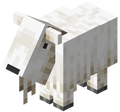

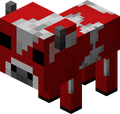




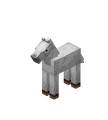
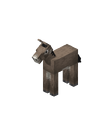
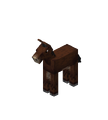




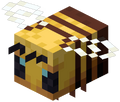



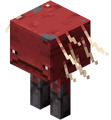
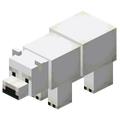


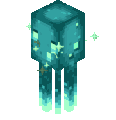
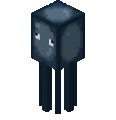






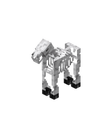
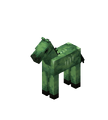

0 Response to "How Much Health Does Minecraft Animal Feed Traders"
Post a Comment